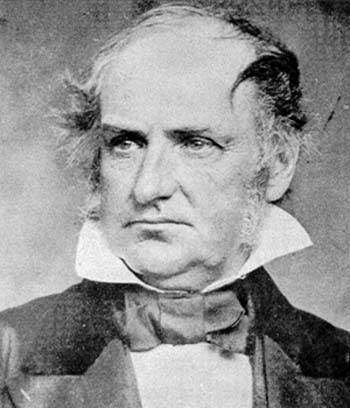Narrative of a Private Soldier » Chapter I » First California Regiment
My great-great-grandfather, Charles Lewis Francis, arrived from Wales in 1860, at age 17, and shortly thereafter participated in the action of the Civil War. In 1879, he wrote and published a memoir of this period. I’ve scanned in the text and made it available as raw PDF scans and as an incomplete full-text PDF. As I correct the OCR’d chapters, I’ll be posting the sections to my blog. This is the fifth section of Chapter I.
It might have been a little before that that I went with some couriers who delivered at Poolesville certain despatches for General Stone. It was rather late one afternoon that we left Washington by the Rockville road, and it was almost dark when we galloped through Rockville, the county seat of Montgomery county, Maryland. The town bore an appearance of old age and decrepitude, and there were no attractions for us to stop, even if our orders had not been imperative not to do so. Later, we arrived at Muddy Branch, or Darnstown. Darnstown was no town at all at that time, but I remember that Muddy Branch was very muddy.
There were only two or three houses in the town, but they were “on the Pike,” and there was a cross-road leading to a ferry on the Potomac river a few miles to the south. There were ten or twelve regiments of infantry encamped thereabouts, and shortly after our arrival nearly all of them took up the line of march for Poolesville, a few miles further on. It was late fall or early winter, and the night was very cold. About midnight we arrived at Poolesville, and the General received his despatches.
October 21, 1861
We did not know, at least I did not know, the contents of our papers, but early that morning Colonel Baker, of the First California Regiment, was across the Potomac river, and the battle of Ball’s Bluff was fought and lost. I went over after the battle, and penetrated nearly to Leesburg. I was, at times, inside the enemy’s lines, but did not know that until I had got out again. That was the first time that I had actually seen men killed and wounded on a battlefield, and, it may seem strange, but I do not remember that I experienced the peculiar feelings to be expected. It was not until Winchester that I did so. But of that as I get on with my story.
Soon after the repulse and defeat the body of Colonel Baker was recovered, and I returned to Washington with its escort, having been absent about three days. There was deep feeling manifested upon the death of Colonel Baker. He was extremely well liked by the men under him, and their lamentations were loud. Although this regiment was called the “First California,” it is not to be concluded therefrom that it was composed of Californians. It was not so to any great extent. Colonel Baker had been a Senator from Oregon, or California, I forget which, and I believe represented one or the other in the Senate of the United States at the outbreak of the war.
I saw the regiment when it was being organized. It was encamped on the Bladensburg road, just outside of the corporate limits of Washington. Its organization was different from that most other regiments in this, that there were seventeen or eighteen companies, four of which at least had been recruited in Philadelphia, Pennsylvania, and more in various other cities in unequal proportions — this I know, because I witnessed scenes of emulation, to designate it lightly, between the men of different States. Besides his regiment, he had several others at Ball’s Bluff. There were, I think, the Nineteenth and Twentieth Massachusetts, and I have an impression that I recognized the Fifteenth regiment from the same State.
Colonel Baker was an Englishman by birth, but had been brought to this country at a very early age. In person and appearance he was large and heavy; he had a full face, florid complexion, and he wore a full beard and whiskers, with this he had a kind, benevolent, and fatherly expression of countenance. It was generally remarked that he was too good a man to be recklessly exposed to danger, and there was manifested a strong disposition toward having an investigation to ascertain whether the Colonel’s next superior officer was not to be blamed for the disaster.
